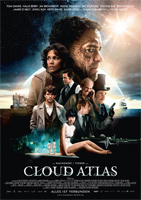 I’m reviewing the movie here, not the book it was based on. I actually tried reading the book, but I have a hard time reading dialect, and both book and film half quite a bit of it. Hence, I settled for the movie.
I’m reviewing the movie here, not the book it was based on. I actually tried reading the book, but I have a hard time reading dialect, and both book and film half quite a bit of it. Hence, I settled for the movie.
I was quite taken with the trailer when I saw it over the summer and was really looking forward to this. It promised to be a little deeper in the intellectual waters than most American films. And yeah, I’d say it was deeper all right. It ended up being one of those films I was going to have to see more than once to really know what I thought about it. Alas, I didn’t get the chance to do so before it promptly vanished from the theaters, so that will have to wait until it comes out on disc.
First of all, I have to say it is a visually beautiful film. The settings (both real and virtual) are gorgeous, and the cinematography is stunning. It’s a testament to how seamless effects can be in a film that’s not really billed as a special effects bonanza. Things that are quite unreal simply looked real.
Second, the movie hops around quite a bit, but I think it does so to its benefit. It’s really six tales interleaved with each other, but they are all separated by time, anywhere from fifty to three hundred years. And yet, there were connections between most of the tales, some subtle, some not. Some of the connections were about cause and effect, while others were more tangential. I would say they were actually all connected, but there was one link going forward that I could not spot in my memory of the film.
And third, the cast was a fabulous collection of A-list actors, with each of them playing multiple roles that were often quite different. It was only when the credits rolled did I realize just how many roles they each played. I expect this film to win various technical awards for its costumes and make-up.
So, all of that is the blah-blah-blah that movie reviewers go on about when describing some high-concept art film, but it never really tells us what the film is about.
So, what is this one about?
It’s kind of hard to say, but to sum it up, I would say it’s about the terrible things we humans do to one another as well as how individuals face that. Some of them fold under. Some stand up and fight. And others make good their escape. And these six tales examine many of humanity’s real and imagined sins ranging from historic slavery all the way forward to post-apocalyptic barbarism. And I would say it did a good job at it.
So, in short, the six tales are about the following – and no, these aren’t really much in the way of spoilers:
- the American institution of black slavery
- the treatment of homosexuals in historic “polite society”
- the abuse of corporate power against citizens
- the shutting away of our elders
- the denial of basic rights to artificial life forms
- the barbaric struggles of a post-apocalyptic world
There was also a hint of reincarnation, cycles of life, and other non-Judeo-Christian views. The preview actually made me expect much more of this than I saw in the film itself. What it had was actually pretty vague and open to interpretation. On exiting, I overheard an elderly couple discussing the film, with one asking, “So, was Tom Hanks supposed to be Christ?” I never would have made that leap myself, but it does show that different people will see different things in the film.
So, if you missed it in the theater, definitely give it a look when it comes out for purchase or rental. I know I’m going to be buying it on Blu-Ray, just to get another look at it.



 I’m reviewing the movie here, not the book it was based on. I actually tried reading the book, but I have a hard time reading dialect, and both book and film half quite a bit of it. Hence, I settled for the movie.
I’m reviewing the movie here, not the book it was based on. I actually tried reading the book, but I have a hard time reading dialect, and both book and film half quite a bit of it. Hence, I settled for the movie.





